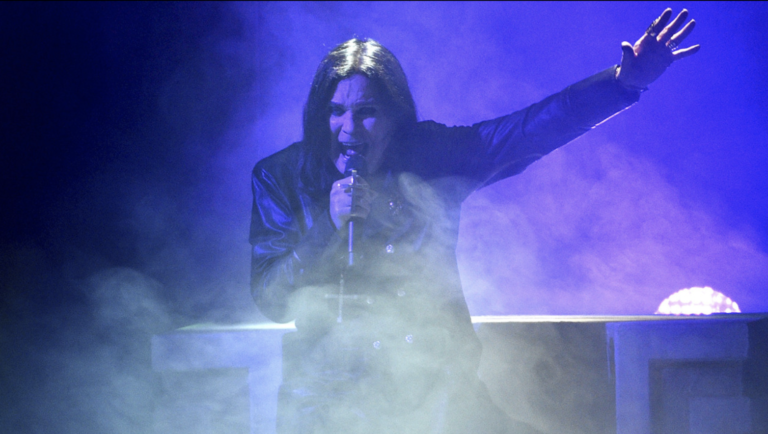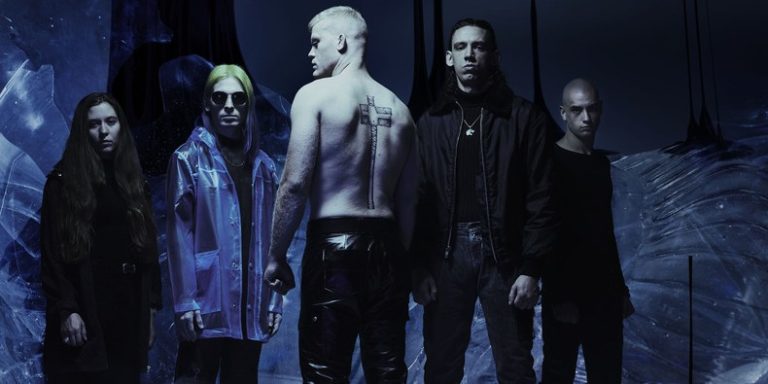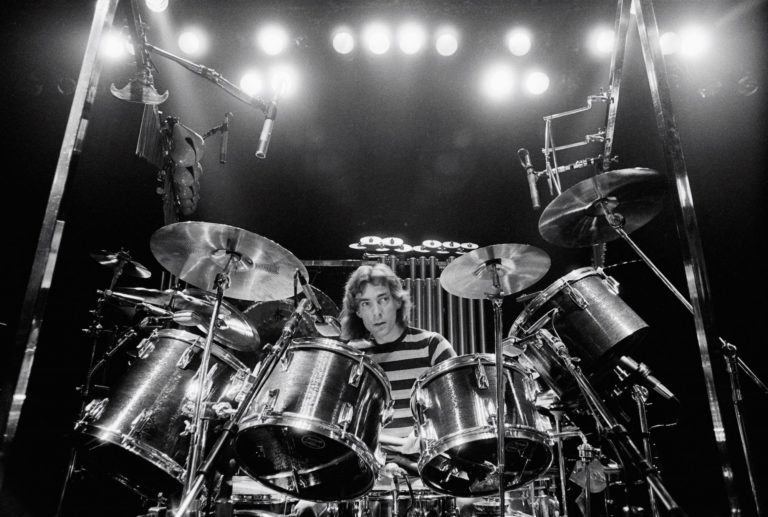KILLSWITCH ENGAGE’S ‘ATONEMENT’: 10 THINGS WE LEARNED ABOUT MAKING OF NEW ALBUM
The new Killswitch Engage record, Atonement — their eighth, overall — is one of the year’s most anticipated, and for good reason. Metalcore pioneers (who are also celebrating their 20th anniversary this year) have been on a creative roll since reuniting with original vocalist Jesse Leach in 2012. Their latest offering, which is due August 16th via Metal Blade Records, is heavy as all hell. Shortly after hearing it earlier this summer, we caught up with the dynamic duo of Leach and guitarist-producer Adam Dutkiewicz in a Brooklyn park for coffee, pumpkin-flavored whoopie pies and in-depth conversation. Here are 10 things we learned from them about Atonement’s making — from how the frontman’s vocal surgery was both the worst andbest thing to happen to Leach, to what it was like working with guest vocalists Howard Jones (whom Leach had recently met at that time) and “big ol’ teddy bear” Chuck Billy.
1. Jesse Leach thought he might have to give up singing and go back to bartending
When the Killswitch singer discovered he needed surgery last spring to remove a polyp that developed on his vocal cords, he wondered if he would ever sing again. “That was the first thought I had,” Leach told us with a nervous laugh. “It sounds really pessimistic but I knew it was going to happen sooner or later. Because when you come offstage spitting blood … something’s going to give at some point. So I was scared, yeah. I was literally thinking to myself, Well, I guess I can go back to bartending if this doesn’t work. But, thankfully, it worked.” But it wasn’t just the surgery that worked: The procedure was followed by three months of intensive recovery full of speech therapy, vocal therapy and scream therapy.
2. Leach’s voice sounds different post-surgery, and his outlook on performing live has changed, too
To the attuned Killswitch fan’s ear, nuanced differences in the frontman’s singing on Atonement — which he describes as more “round” — are apparent. After the surgery and the training he underwent during recovery, Leach says his voice feels different and singing takes less effort. “I’m actually enjoying myself more onstage,” he enthused. “I can focus more on the performance, the audience and engaging people. It’s made me a better lead singer because the technique has taken precedence over me worrying about my voice, me worrying about hitting those high notes. I was always stressed out onstage.”
3. As with Incarnate, Leach battled writer’s block when making Atonementand Adam Dutkiewicz helped him push through it
During the creation of Killswitch’s previous album, 2016’s Incarnate, Leach suffered from writer’s block and only with the help of guitarist-producer Adam Dutkiewicz, found a pathway out. History repeated itself with Atonement.”He made it hard on himself this time at first because he didn’t ask for my help,” Dutkiewicz revealed to us. “So, I can’t help if he doesn’t ask for it … It’s like, ‘I offer my resources, Jesse, and you don’t take them!'”
Leach laughed before admitting that his bandmate was right: “There was a really eureka moment during this where I realized I couldn’t do it on my own. I was trying to present something that was polished and ready to go, and it just wasn’t happening. So instead of asking for help, I kept beating myself up over it. We finally had a talk — ‘What are you doing? I’m the producer. That’s my job.’ So I showed him my lyrics and we started working on stuff together and I was like, ‘Oh, this is great. I want to do this more.’ And he was like, ‘That’s what I’ve been trying to fucking tell you to do!’
4. Leach only got to know former Killswitch/current Light the Torchfrontman Howard Jones shortly before they recorded their Atonementduet “The Signal Fire”
It’s a collaboration that made headlines, bringing together both of the band’s iconic singers in the studio in April of 2018. But the first major step for Killswitch to make “The Signal Fire” (the title is a nod to the name of Jones’ current band) was a simple one: Leach had to get to know Jones.
“I was always friendly with Howard. Respected him, and gave him his space after he left and all that,” Dutkiewicz told us. “Jesse was intimidated by filling his shoes. And I think there was just this mental hangup and awkwardness between Jesse and Howard because of that. But one day I was like, ‘Fucking watch this. We’re all going to hang out in a room together and see what happens.’ And then Jesse was like, ‘Wait a minute, Howard is, like, the coolest guy in the world. Never mind.'”
“I didn’t know him!” Leach said. Then the two singers hung out for the first time in February 2018, backstage at a show in Canada. “I became very fast friends with him, like, within probably 10, 15 minutes of talking to him. He was super relatable, you’re not this thing — because we didn’t know each other. All I’m getting is stories and what the media portrays. And it was like, this weird little thing going on between us, but there was nothing going on between us.”
5. Atonement’s other guest vocalist, Testament‘s Chuck Billy, appears as “a nod to people who started this shit”
“He’s a legend!” Dutkiewicz enthused over Chuck Billy, who lends his death growl to Atonement ripper “The Crownless King.” “We toured a bunch with Testament and Chuck Billy is just this outstanding gentlemen of a man. He seems so imposing when you see him because he’s this huge guy, he looks like he should be playing on the front line of a football game, but he’s a big ol’ teddy bear. We love him, his voice and Testament. We wondered would he do that for us? So we threw it out there, and all the sudden he gave us some vocals.”
“It’s a nod to people who started this shit,” Leach added. “I feel like Testament doesn’t get their due when it comes to the Big 4 and thrash. To me, Testament has been one of the most legit, solid metal bands that hasn’t really fucking worried about trends or change things.”
Dutkiewiczagreed:“They are going hard. They are metal as fuck still. There is something to be said for that, holy crap.”
6. Speaking of “going hard,” Killswitch consciously decided to make a heavier record this time out
While most of Atonement was written by the time they were touring with Iron Maiden overseas, it was a explicit conversation in London in the midst of that trek that solidified the album’s direction. “I was like, ‘Let’s just crank out some heavy stuff.’ It’s what we’re good at,” Leach recalled.
“I wanted to do that. Maybe that’s why I ended up writing all those fast songs,” Dutkiewicz said. “I tried to push the limits.” And indeed they did.
7. Some of the album’s material dates back as far as 2016, and Dutkiewicz doesn’t want it that way next time
“I wrote a lot of that material, like, two years ago before we were even talking about going on tour with Maiden. That’s how long I’ve been working on this damn record,” the guitarist explained. Between Leach’s recovery period, multiple tours, the ups and downs of songwriting, and the rigors of the production process, the album kept taking longer and longer to complete. “I think the next record we make, we should set it up where we only have two months to work on it and don’t look back,” he continued. “I think it would be fresher and we would be more rewarded at the end of the day. Two months is a great time because anything beyond that, you beat yourself up and you can actually make the songs worse by over-analyzing. You hear of artists working on records for 10 years. How the fuck do you do that? I’d go fucking crazy.”
“Like a ‘The Spaghetti Incident?’“Leach interjected.
“Imagine that. Chinese Democracy,” Dutkiewicz laughed.
8. Communication within Killswitch is improving — so no band member gets their face ripped off
Killswitch Engage are made up of five strong and very different personalities — Leach, Dutkiewicz, guitarist Joel Stroetzel, bassist Mike D’Antonio and drummer Justin Foley — which, at times, can cause tension and communication breakdowns. “I guess there is a lot of passive aggressiveness in our band, which I’m completely exhausted of,” admitted Dutkiewicz.“Then a year later you’re like, ‘I’m gonna fucking kill that dude if he walks in this room. I’m gonna rip his fucking face off and shove it in his asshole.’ You know what I mean? You should never let anything get that bad. There’s no reason!”
It happens, though. After all, a band is like a family and families fight. As Leach explained, “We do all have a common love for each other and want to make this band work. So, yeah, he’s right. We’ve definitely thrown some stuff under the carpet and things that still need to be addressed. But the general air of the five of us is we do all want the best for each other.”
9. Atonement’s anarcho-punk lyrics are a reflection on the times
While Leach has always written about social injustice, freedom and individuality — from the early days of Killswitch to more recently, on songs like “Hate by Design,” or in his punk project the Weapon — it’s impossible to ignore the anarchistic views expressed on Atonement. For example, on “Know Your Enemy,” Leach spits: “Bow down to no one/Resist the system/And fight back” and “They can’t suffocate a mind that’s free.”
Leach offered of the LP’s general theme: “Social justice, inequality, stuff that people are wrestling with on social media and arguing with. To me, that’s huge. That’s been the backbone.
“I get to the point where I throw my hands up and I’m like, ‘Fuck it.’ Shit is so fucked up right now. My only reaction is just anger. It’s all I can muster. Frustration.
“Also there’s no agenda there. It’s just about a liberated mind. It’s not a lean towards left or right or any of that bullshit, I don’t subscribe to any of that. I really don’t. I just think people need to learn how to be better humans to each other. And as simple as that sounds, it’s totally profound.”
10. That said, the Atonement song Leach is most proud of is a personal one that touches on a subject near and dear to his heart: mental health
As someone who has been very open about his own mental health struggles and is seen as an advocate for the issue, Leach told us that he’s particularly proud of Atonement’s second single “I Am Broken Too.” In addition to spreading awareness of the topic of mental health with the song and its video, band is also donating a portion of proceeds from the single to Hope for the Day, a non-profit that focuses on suicide prevention and mental health education.
“Justin wrote the song and as soon as I heard it I was like, ‘Wow. OK, the chorus is going to come right in. That’s nuts!'” Leach said. “Not intentional, but short and sweet and gets right to the point. That songs still makes me well up in tears. It’s not about me, it’s about somebody else, but me saying to them, ‘Look you’ve been trying to pretend you’re OK, and I know you’re not.’ That line, “And if you needed proof/I will reopen my wounds,” I had just written that and Adam was like, ‘No, you have to bring that in, it’s powerful.’
“I want to speak to people and I wanna let them know they’re not alone. I can’t help it.”
Below, see Jesse Leach discuss his mental health struggles and how music has helped him persevere:




